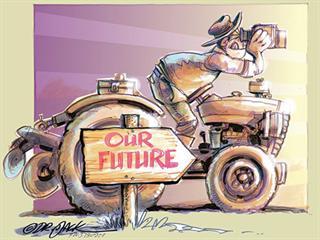
What is important to farmers? Removing the uncertainties around land must surely be the most important. When talking to farmers, we often enquire what is important to them. Is it land ownership, or the control of land, or the management of it? We must always remember what happened to our neighbours to the north of us in Zimbabwe. I had the opportunity to interact with some farmers from Zimbabwe and I posed some questions to them. For instance, I asked them what they would have done differently.
Political allegiance
The first thing I learned was that farmers must never become too political and show their allegiance to a specific political party. Remain behind the scenes. Be involved, but remember that it is very dangerous to show your allegiance, as we saw with the farmers who backed the opposition MDC in Zimbabwe. Another thing these farmers told us is that now is the time we need to act to secure our own destiny. In fact, we were cutting it fine.
In South Africa, we have our own debate on land reform. Julius Malema and the like come to mind. Rightly or wrongly, these people profess to represent the poor. We must never lose sight of the unemployment situation in South Africa. Official statistics tell us that 25% of our potential working population is unemployed. Some say this figure is closer to 40%. A large number of these unemployed have no food or security, let alone a roof over their head. So when Malema calls for expropriation without compensation, believe me, he has a substantial following.
These calls have made ex-Zimbabweans feel as if we are going the same way as that country. Remember that farmers without land are not in business. And that is the bottom line. So in trying to encourage farmers to be positive, let me share some of my thoughts. Land is an emotional issue and trying to solve the problem will require rational thinking. The important thing to remember is that this situation is not unique to South Africa.
Here, I would like to urge my fellow farmers to think out of the box. Every area in every region is different to the next, so it is not a case of one size fits all. What is important is the will to succeed. The solution lies with you, the farmers. The answer must surely lie somewhere between partnerships, joint ventures, sale and lease back options, and equity schemes. This is where farmers can play a role in mentoring and transferring skills.
Don’t sell yourselves down the river for any organisation; you are important role players in the country. The overriding condition to all of this is that the economics of farming remain intact. It is imperative for farmers to be allowed to continue making a living.
From recent interactions with the ‘powers that be’, it is becoming abundantly clear that government views agriculture as a cornerstone of the country’s economy. More importantly, it is the most important contributor to rural stability and security through job creation in the outlying areas.
Land claims
As mentioned earlier, land claims are not unique to this country. Who would have thought that New Zealand and Australia are also dealing with land claims at the moment? And in the northern hemisphere, consider the land claims in Ireland and Scotland. In Scotland, some of these are up to 600 years old. Yes, land is an emotional issue, and farmers tend to become very emotional about it. But we are fortunate to have a willing government and a willing farming community – so the future is in our hands.
It is not going to be easy, but who said farming is for the faint-hearted? It reminds me of the words of JF Kennedy: “Change is inevitable, and those of you who fail to embrace it are certain to miss the future.” I think these words are important when thinking about your land. In my own farming operation in Melmoth, my brothers and I have been involved in various forms of land reform, ranging from partnerships to equity schemes. When asked how successful they have been, I think I can honestly say they have been very successful.
Have I derived any benefit, and has it given me immunity against land claims? The answer is no. The farm was still claimed. Did it give me immunity from cattle in my cane fields, timber theft, diesel theft, battery theft, telephone wire theft? The answer once again is no. Then one must question whether I benefited from it in any way. It has been difficult, but the important thing is that every year we’ve been able to pay our workers a dividend.
So from the point of view of transferring some of my business skills to my labourers, I think it has been a great exercise. They are starting to understand how business works, and I think this kind of ‘transaction’ may be a possible solution to the land debate. Another consideration to keep in mind is that we shouldn’t be alone as farmers; we should be supported. In the same way, we should also support businesses in our regions, as well as community projects, and be ever-aware of providing land to development farmers.
On the other hand, while it’s all very well to give these farmers land, if we withhold the skills and the finance required to farm this land, we are doing them a great injustice. It is quite disturbing to see the number of failures that this country has had. Government believed that by giving communities land through restitution, the problems had been solved. But this has backfired. All we have seen is land that was once highly productive become unproductive.
We have seen the price of land going up simply because of supply and demand. The less productive land there is, the higher the price of the land that remains in production. It is vital that we get the land audit right because without it, we will never know who owns what. Wouldn’t it be great if race were removed from the equation and farmers could focus on farming?
Agriculture’s prospects good
The prospects of robust growth in the agricultural sector have not looked this good for a long time. Despite this, however, one has to acknowledge constraints such as natural resources, including water and land, in the struggle to expand the agricultural sector. The general economy is also constrained and there is a process of consolidation taking place in the local agricultural market, which is making it increasingly difficult for new entrants.
The industry has been pushed into distress by increasing biosecurity failures and a skewed global agricultural trade environment. This is the result of subsidies, dumping and non-tariff barriers, all of which affect various commodities. Sugar and poultry must be mentioned here.
However, the increasing spending power of urban consumers is creating opportunities for agricultural businesses, both in South Africa and north of our borders – the result of a greater number of middle-class people. This sector is said to have grown by 60% on the African continent – to about 350 million consumers in the past 10 years. Willie du Plessis, head of agricultural business at Standard Bank, says that these consumers are creating unprecedented demand across a number of sectors, including food production. This can only bode well for us as farmers.
One also has to ask how a new entrant gets involved. The answer is quite straightforward: we are going to have to come up with mechanisms whereby emerging farmers are accommodated, and the simplest way to do this is to lease land.
Extension services, agricultural colleges and financial institutions will all have to play their role.
Certainty and safety
In the past 10 to 15 years, I have seen poor farming practices taking place across the country. Trees that should have been replanted have been coppiced. Sugarcane field that should have been replanted have been retuned. And farmers are losing initiative and have stopped developing their farms. They are no longer building housing for their staff or sheds, all because of uncertainty.
Other issues are safety and security concerns, as well as substantial increases in administered prices. We continue to suffer significantly at the hands of criminals in terms of stock theft, crop theft and farm attacks. Here I would like to pay tribute to the farmers who have lost their lives in KZN during the past year. I would also like to express my thanks to Koos Marais who manages our security desk, and express our appreciation to members of the South African Police Services and other related entities. They are always willing to assist us in combating crime in our areas.
As a union, Kwanalu holds firm to the various policies that form the basis of how we conduct our businesses. This allows everyone to understand exactly where we stand on any particular issue. We have responded to the various challenges we have had to face. This requires strong, balanced and principled leadership – leadership which is particularly evident in KwaZulu-Natal.
To the government and other stakeholders, I would like to say that Kwanalu is a dynamic, professional organisation with a positive outlook and future-oriented attitude and approach – and is always ready to participate. We need to succeed for you to be successful.
Conclusion
Notwithstanding all the negatives, I believe we have a window of opportunity to determine our destiny as farmers. Let’s use it well. A great future lies ahead for farming. Speaking personally, I have found it an honour and a privilege to have worked with the farmers of KwaZulu-Natal.
The views expressed in our weekly opinion piece do not necessarily reflect those of Farmer’s Weekly.












